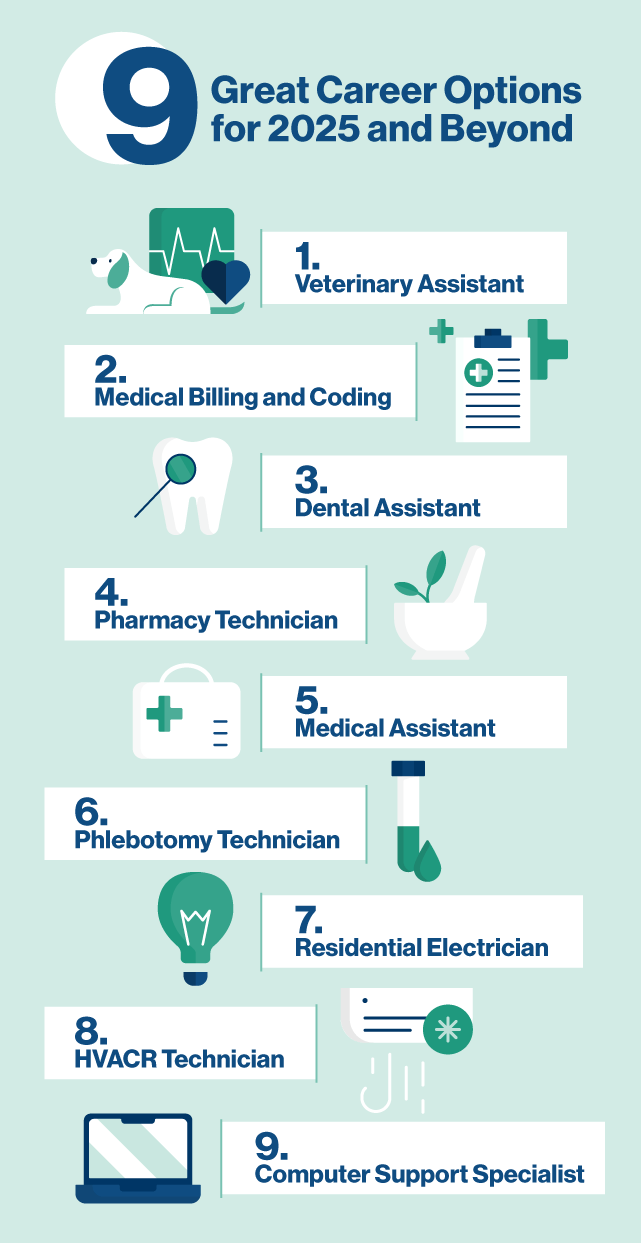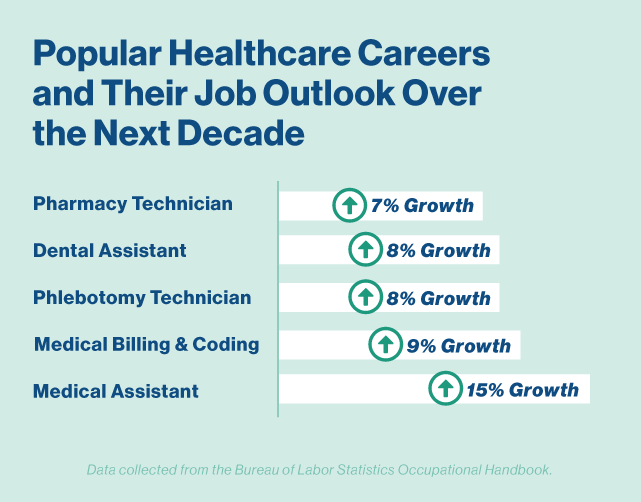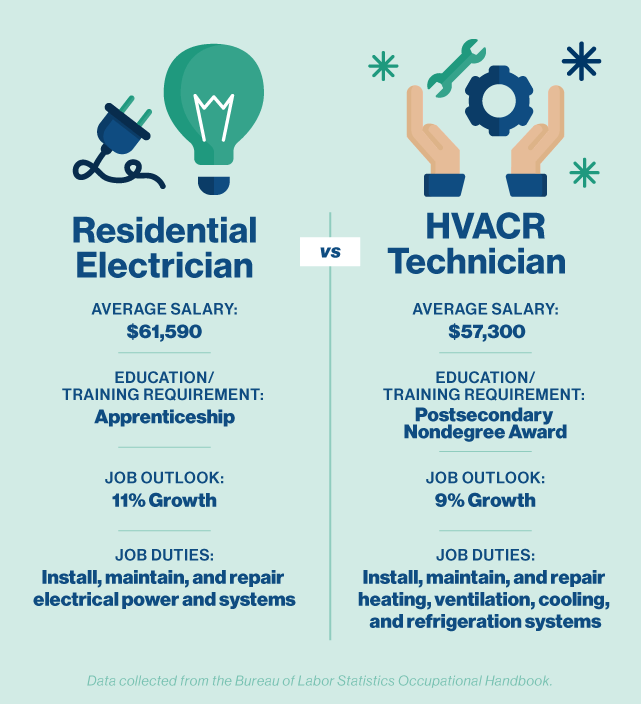
9 Best Careers for the Future
May 08, 2025
7 min read
We follow strict quality and ethics policies to make sure our content is honest, accurate, and helpful. Learn more about our editorial guidelines.
With advances in technology and fluctuations in the economy creating uncertainty, it can be difficult to decide what the right career for you is. The good news is there are several fields that are still thriving as we enter the second half of the 2020s.
What makes a career the best?
The best, of course, is subjective. What’s best for you might not be for someone else. A satisfying career with a reasonable salary can be what many people are looking for. Fields such as healthcare and trades will always be necessary regardless of what happens with the economy or technology, which means entering into them can lead to long-term employment, something that may appeal to anyone looking for job security.

1. Veterinary technician
If you love working with animals, a career as a veterinary technician may be the perfect fit for you. Vet techs assist veterinarians with clinical work and can work in many places, such as small or large animal vet offices, zoos and wildlife facilities, or humane societies. Becoming a vet tech can be an incredibly awarding career for anyone interested in entering the veterinary world.
Average salary: $43,740 per year
Required education: Associate’s degree; certification or licensing
Job outlook: 19%
What do the experts have to say? Vicki McLain, CVT, LATG, VTS-LAM, Veterinary Technician instructor at Penn Foster, advises, "There’s a lot expected in the vet profession, and it’s emotionally taxing. But students need to understand that everyone is in it together, and it’s not embarrassing to ask for help or take a step back when needed."
Read more: What Do Veterinary Technicians Do? (Certified Vet Techs & Vet Tech Instructors Weigh In)
2. Medical billing and coding
The healthcare field has its challenges, but it can also be a rewarding field to work in and offers a variety of important roles. One of these roles is that of a medical billing and coding specialist. Medical billers and coders need to be skilled in many areas, such as analyzing data and process, knowledge of common codes, understanding of HIPAA, time management, and organization. This career can also be a great fit for someone who wants the option to work from home or work flexible hours.
Average salary: $48,780
Required education: high school diploma/equivalent; postsecondary certificate
Job outlook: 9%
What do the experts have to say? Diana Murphy, MSM, CPC, CPMA, CPC-I, CCA, healthcare instructor at Penn Foster, explains, “Medical Billers and Coders love learning, puzzles, problem solving and winning the game. Having your certifications shows you are knowledgeable, thus making you qualified to handle the role in any Medical Facility.”
Read more: Medical Coding Professional vs. Medical Billing and Coding: What’s the Difference?
3. Dental assistant
Working in a dental office can be a great environment for many people. Dental assistants are instrumental to the success of a well-run dental office and can even be promoted to office manager if that’s their aspiration. Their work is mostly administrative but they also assist dentists and hygienists with things like taking a patient’s medical history and explaining procedures.
Average salary: $46,540
Required education: Varies by state
Job outlook: 8%
Read more: How to Become a Dental Assistant (Salary & FAQs)
5. Medical assistant
Medical assistants play vital roles in many healthcare offices. If you are interested in a healthcare career that entails both administrative and clinical tasks, this may be the role for you. Medical assistants can work in a variety of healthcare environments, including physicians’ offices, hospitals, and outpatient care centers.
Average salary: $42,000
Required education: high school diploma and often a postsecondary certificate
Job outlook: 15%
What do the experts have to say? Theresa Sinkevich, RMA, instructor, and academic partnership coordinator for Penn Foster’s Allied Health programs explains, "There might be opportunities within the doctor's office to move up and be the head medical assistant. Or they might offer their own educational programs where they would possibly send you to school to become a nurse."
Read more: Your Guide to Medical Assistant Duties
6. Phlebotomy technician
If you’re not afraid of blood, becoming a phlebotomy technician may be the right move for you. Skilled phlebotomists are important roles of many healthcare offices and patients’ well-being, since without phlebotomists there would be less people able to draw blood to test for issues or conditions. Phlebotomists must be skilled in drawing blood but also should have proficient soft skills for dealing with children or patients who struggle with getting their blood drawn.
Average salary: $41,810
Required education: high school diploma; certification often preferred
Job outlook: 8%

Read more: Top Healthcare and Medical Careers for 2025
7. Residential electrician
Seeking a career in trades can be a smart move since many skilled trades will always be valuable to home and business owners. We all have electricity, so becoming a residential electrician can be a great career option. As an electrician, you can work for an established company or be your own boss and open your own business. You’ll likely have to start with an apprenticeship before working in the field without supervision since on-the-job training is crucial for this type of work. Electricians work in installation, repair, and maintenance of electrical power.
Average salary: $61,590
Required education: Apprenticeship; some states require licensure
Job outlook: 11%
What do the experts have to say? Steve Strapple, academic lead of Penn Foster’s skilled trades programs, emphasizes the importance of certification in the trades field. "Education is going to open doors to bigger opportunities. Every certification means more money in your pocket because you are more qualified."
Read more: New Year, New Career: 10 Tips for Changing Careers in 2024
8. HVACR technician
Like electricity, heating, cooling, and refrigeration are all things everyone uses in some capacity. That’s why HVACR technician is a great career to go after. Whether it be residential or commercial, there is work to be done. HVAC techs work on installing, maintaining, and cleaning HVAC systems. They also do inspections on systems to ensure they are working correctly. To work in this field, you’ll need to have technical skills as well as problem solving skills.
Average salary: $57,300
Required education: Most commonly a postsecondary nondegree award like a training program; may require licensure or certification
Job outlook: 9%

Read more: How to Become an HVAC Technician (Guide)
9. Computer support specialist
Computer information systems is a great career field for those who are tech savvy. Most businesses need IT support in some capacity. Computer support specialists need both technical and customer service skills to effectively be able to assist with tech issues. As an added bonus, working in this field means you will likely be able to solve your own tech issues when your personal computers conk out on you.
Average salary: $60,810
Required education: high school diploma or equivalent; associate degree or some college courses in many cases
Job outlook: 6%
Read more: 5 Jobs You Need to Know About in 2025
Decide what career is best for you
While not all of these careers require formal education, having it under your belt never hurts. Penn Foster can help you get a leg up in a variety of fields through our college and career programs. With self-paced programs you can complete on your own time, it could be the perfect thing to help you achieve your goal in the field you want. You can enroll online or by calling an admissions specialist at 1-800-275-4410. If you’re unsure if this is the right move for you, request more info to get all the facts before making a decision.



